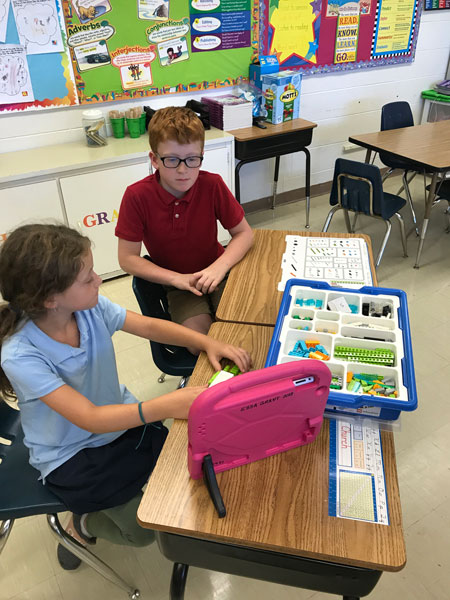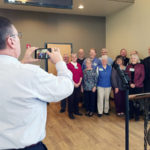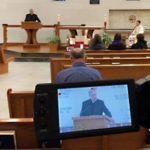By Lindsay Steele
The Catholic Messenger
KEOKUK — When students at St. Vincent’s School learned about the life cycle of a frog earlier this school year, they didn’t just read about it in their textbooks. They made three-dimensional, moving models using Lego engineering and robotics kits.

Carley Church, left, and Christian Cook, third-grade students at St. Vincent’s School in Keokuk, use Lego Robotics during class earlier this school year.
To complete the project, students first watched a short video on an iPad and answered questions, elementary teacher Lisa Klesner said. Next, students teamed up to build tadpoles using Legos, gears and a battery-operated motor. The students watched the tadpoles wriggle around and took notes before building “froglets” with legs and a tail. Finally, the students removed the tails and lengthened the legs to construct adult frogs.
The frog project is one of many that students at the Keokuk Catholic elementary school have completed to enhance their social skills, teamwork, basic engineering and basic computer programming skills, Klesner said.
The school got involved in Lego Robotics in 2015. Lee County Economic Development Group started a Lego Robotics program as part of its workforce initiatives that year and looked for volunteers to help with the pilot program through the libraries. Klesner volunteered to teach it at Keokuk’s Donnellson Library. “The pilot program was a big success and the economic development group was looking to take the program into the elementary schools,” she said.
That fall, St. Vincent’s School started small with three Lego We 2.0 robotic kits, which the economic development group donated. Group representative Dana Millard offered instruction on how to use the kits. “She provided lesson plans and showed how they align with Next Generation Science Standards (NGSS). She also gave ideas for supplemental materials,” Klesner said.
The following year, the school utilized Every Student Succeeds Act (ESSA) funds to purchase two additional kits, along with eight renewed iPads to use with the kits.
Generally, teachers use the kits to supplement science curriculum. The program is geared toward students in grades three through six who are able to work more independently. The students have completed a variety of projects including making an alligator, helicopter and a fan to enhance learning and gain problem-solving skills. “If for some reason the object doesn’t move (correctly), the kids have to go back and find their mistake and correct it,” Klesner said.











